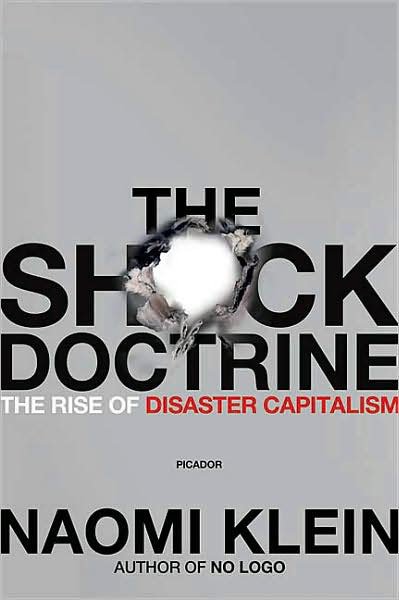"The Shock Doctrine: The Rise of Disaster Capitalism" (Picador USA, 2008, $16), is so well written and researched that you will find it as difficult to put down as anything by your favorite fiction writer.
But this is no fiction. Award-winning journalist and author Naomi Klein has done something both miraculous andfor the powers that bedangerous: Miraculous because it is a book about economics that readers will not only understand but also find engrossing; dangerous for exactly the same reason.
Klein exposeswith razor-sharp investigative reportingthe damage done by the fundamentalist economic theories of Nobel Prize winner Milton Friedman, who said: "Only a crises actual or perceived produces real change." Known collectively as free-market capitalism, Friedmanism, neoconservativism or "corporatism," those theories have not only been responsible for millions of deaths across the globe, she writes, but also ensure that the U.S. will never again be without a war.
"It is a fairytale history, scrubbed clean of the violence so intimately entwined with this crusade," she writes of the accolades heaped on Friedman. Rather, she says, Friedmanism is "a variation on Machiavelli's advice that 'injuries' should be inflicted 'all at once.Ҕ
In the book's opening chapters, Klein writes about experiments, which Canadian psychiatrist Dr. Ewen Cameron conducted in the 1950s, to wipe the mind's slate clean so that "healthier" thinking could be substituted. Those CIA-funded experiments (a well-documented fact) primarily employed electro-shock therapy along with isolation, and other mind-altering "treatments."
Completely ineffective as therapy, the methods proved extremely effective as torture: By shocking the subject into fear, complacency and complete disorientation, torturers can force detainees into accusing their mothers (or country) of vile crimes "just to stop the pain." The end result is not extraction of information, but compliance.
Economically, Klein shows that Friedman and his disciples, the "Chicago Boys," recognized that shocking eventsmilitary coups, enemy attacks, hyperinflation and natural disasterscan so disorient people that they are willing to accept changes they would normally find intolerable. Capitalists should be ready, Friedman says, to exploit and manipulate shock by quickly injecting sweeping policy changes. Disasters, in the Friedman book of economic fundamentalism, are merely capitalist opportunities.
In example after example, Klein drives that point homeand the collective human liability of Friedmanites. Although stemming from democratic government, corporatism does not require democracy; the system positively blooms under despots, unconcerned with the cost in human life. In Chile, Friedman personally played a pivotal role in Pinochet's rise to power, and thousands fell into poverty. It surfaced in China after the Tiananmen Square massacre, and in Boris Yeltsin's Russia, with enormous human tolls. Democracies certainly aren't immune, though. Corporatism devastated populations in Sri Lanka after the 2004 tsunami, in Iraq after the U.S. invasion and on the post-Katrina Gulf Coast.
Imposed through three driving rulesprivatization, elimination of government social programs and smashing trade unionsדpure" free-market capitalism allows the market to balance itself, without the "interference" of government, according to Friedman, which should only exist to expand the free market. But corporations, as they have demonstrated over and over, have no conscience; their mandate is profit, and they must have constant growth to provide shareholder equity.
Friedman's theories have even subverted the roles of the World Bank and the International Monetary Fund, organizations whose charters mandate righting the economic circumstances that made Germany ripe for Nazism in the '30s, for example: punitive restrictions causing hyperinflation, joblessness and eventually, World War II. Today, a country in the throes of economic upheaval must slash its social programs and sell off its assets to receive aid, often plunging millions into devastating poverty, malnutrition and death.
Friedman's theories have influenced U.S. economic policy since the Reagan era, one-by-one overturning the social Keynesian economics introduced during the Great Depression. Through privatization, many of the social functions once managed by the governmentschools, prisons, armaments and armed forces logistical support, and vital infrastructure components (post office, transportation, utilities and so forth)are now completely or partially privatized. Homeland security, which one could expect to be an over-riding governmental obligation, is today's premiere private growth industry, and the Iraq War, which costs American taxpayers billions every month, is the most privatized war in history.
If one's market is "security," one must have an enemy to secure against, "actual or perceived." In the corporatist realm, security companies must create a conflict if none exists. It is no accident that Halliburton has received billions in non-bid, cost-plus contracts since Sept. 11. And corporate elite, despite clear conflicts of interest, hold (or held) key posts in the Bush administration. In another time and place, we would call them war profiteers.
Despite what Friedmanism has inflicted on the world, Klein's closing chapters present a message of hope. "Markets need not be fundamentalist," she writes.
A New York Times bestseller, "Shock Doctrine" has been translated into 23 languages at this writing. Find more info at The Shock Doctrine.



Comments
Use the comment form below to begin a discussion about this content.